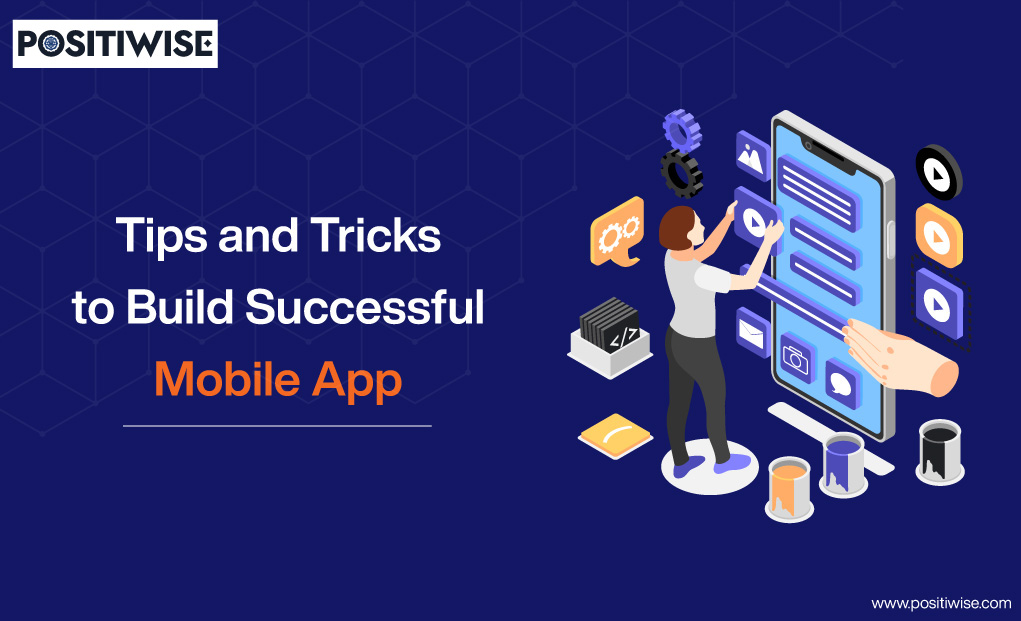Quick Overview:
With the increasing usage of mobile phones, the demand for mobile applications is also increasing. Every organization demands a mobile app that can fulfill their customers’ needs, help them accelerate retention and revenue, and reach out to their target audience. As a mobile app developer, you must provide an appealing and avant-garde application that can support fulfilling all such objectives.
Besides an appealing user interface and cross-platform compatibility, a mobile application is much more. It would be best if you focused on its security, removing bugs before release and supporting it after the deployment. Further, some professional tips and tricks can help you curate a path to build a new-age mobile app. And here, you will find all such top tips that an app developer must remember. So, let’s get started.
Short Guide on Mobile App Development
Mobile app development is creating software applications that run on mobile devices such as smartphones and tablets. Developing a mobile app can be complex, but by following a few key steps, developers can ensure their app succeeds. Here is a short guide on mobile app development for developers:
Conduct Market Research:
The first step in mobile application development is conducting a market search to learn about competitor apps. And also search about what type of applications most people prefer. Once you have all such information, you will know what to include in your application to fulfill the needs of primary and secondary stakeholders. In addition, it also gathers details about the version of the operating system getting used. It will support you in selecting the right platform and technology to choose from.
Furthermore, market research will support you in making the decisions:
- Selecting the mobile development technology
- Identifying the suitable set of users
- Defining the business objectives
- Configuring the proper security controls
Design a User-friendly Interface:
A user-friendly interface is crucial for a successful mobile app. The layout and navigation are simple and intuitive, allowing users to find and access the needed features easily. Make sure that app’s user interface is easy to use and navigate. It ensures that even if someone has never used an app before, they can still access your app’s features without facing any problems. It also provides that people who use it will not get bored swiftly because something new will always happen in the game or on the website. A good interface should make it easy for users to navigate the app.
Choose the Right Platform:
Mobile apps can be developed for iOS, Android, and Windows platforms. Choose the platform that is most appropriate for your app and target audience. Different platforms are available for mobile app development, such as HTML5, Native Mobile Apps, and hybrid apps using both HTML5 and native platforms (Android or iOS). You need to choose one based on your budget and time frame for development. If you have limited resources, it’s better to go for hybrid apps; however, if you have more time and money, go with the native platform first, as it gives better performance than HTML5.
Write clean and Efficient Code:
Writing code is the core of any mobile application. And writing clean and efficient code is the best practice every mobile application developer must follow. Following such a procedure, code gets into a well-designed structure with appropriate comments and reusability of only essential components. In addition, it aids in reducing the attack’s surface and maintaining data integrity, availability, and confidentiality. Furthermore, well-written code is easy to debug, helping developers to remove errors and release a bug-free mobile app. Also, such a codebase effortlessly runs on each digital platform and supports providing an impeccable user experience.
Test and Debug:
Testing a mobile application must be in your development checklist. And it must be a rule that only application gets released after undergoing testing procedures. When creating an application, assess its functionality, performance, data flow, and security under different digital environments. It would help to use manual and automated tools to perform app tests. Due to it, you will know about the software’s lack of controls, functionalities, and bugs. Further, you can patch them and efficiently align the application with project objectives and industry standards. As a result, it will optimize performance, usability, and quality.
Monitor Analytics:
One of the most crucial post-deployment operations is monitoring the mobile application’s functioning. It helps to determine the performance, security, user interaction and data flow, and all other app metrics. And leads to assurance of whether the application is fulfilling expected metrics. Furthermore, all such data aids in analyzing the areas in which the app is lacking and helps to improve its functioning for better end-user engagement. In addition, analytics also help discover security loopholes, enabling you to patch them before any malicious attacker exploits them. Therefore, analyzing the mobile app leads to maintaining its quality, performance, and security.
Keep on Updating:
An organization must constantly update its mobile application to maintain its performance, stability, and security. As the organization grows or a new version of technology comes into the market, you must align your app with it. In addition, if you find a new customer requirement, it must be implemented in the software. Once you start pushing updates, it will help you accelerate business operations, comply with industry standards and fulfill stakeholder needs. Also, the vulnerable loopholes will get patched, reducing the possibility of facing a cyber-attack. In addition, updates will help you rank high on the online store lists, efficiently reaching out to the target audience and engaging and retaining them.
Role of Mobile App Developer to Build a Professional Application
Hire a mobile app developer who will be crucial in creating professional and high-quality mobile applications. Understanding the needs of the target audience and building features and functionalities that cater to them is one of the key responsibilities of a mobile app developer. Designing and implementing a user-friendly interface that is easy to navigate, writing clean and efficient code optimized for performance, and testing the app on different devices and platforms are essential tasks. Once the app is ready, it is deployed to the app store and made available to users.
After launch, a mobile app developer monitors analytics to understand how users interact with the app, identify any issues impacting user engagement and maintain the app by addressing any bugs that might arise and adding new features and updates. Hire a mobile app developer responsible for keeping up-to-date with the latest developments in mobile technology and industry best practices to ensure the app remains relevant and competitive. Collaborating with other team members like designers, project managers, and QA testers to ensure that the app is developed and launched successfully is a critical aspect of the development process.
Unlock Your App’s Potential with Our Expert Mobile App Developers!
Transform your app idea into reality with our seasoned mobile app developers, who specialize in crafting seamless user experiences and cutting-edge functionalities.
Conclusion
Developing a mobile application requires creating a strategic approach to fulfill every project and business objective. To create a mobile app, first, you must perform market research to understand the target audience and other competitor apps. It will help you select the right development technology. In addition, while developing the application, focus on testing it at multiple phases to ensure data security. Moreover, after the app gets released, constantly monitor it and push relevant updates to keep it running smoothly and prevent cyber threats.
Expert in Marketing Strategy and Brand Recognition
Jemin Desai is Chief Marketing Officer at Positiwise Software Pvt Ltd, he is responsible for creating and accelerating the company’s marketing strategy and brand recognition across the globe. He has more than 20 years of experience in senior marketing roles at the Inc. 5000 Fastest-Growing Private Companies.



